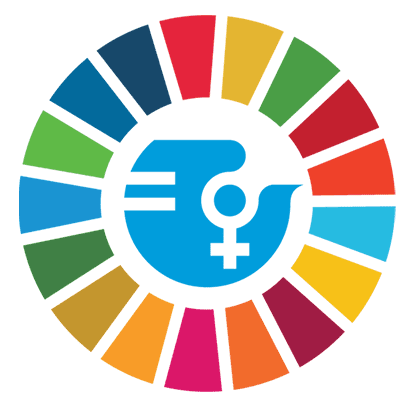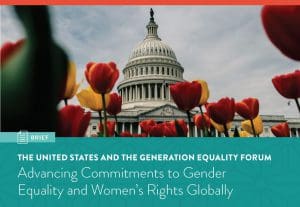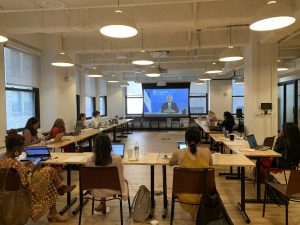
Generation Equality Forum: Commitments & Action Steps
What is the Generation Equality Forum?

In 1995, women’s rights activists and leaders from around the world met at the Fourth World Conference on Women in Beijing to agree upon an action platform, which shaped a transformative and widely recognized plan toward achieving gender equality.
Twenty-six years later, U.N. Women and the governments of Mexico and France, in partnership with civil society and the private sector, co-convened the Generation Equality Forum (GEF) to assess gaps and priorities since the Beijing Conference. The two-part forum—which kicked off in Mexico in March 2021 and culminated in Paris in July—brought together diverse stakeholders to drive new action and commitments across funding, advocacy, policy, and programming.
Without matching implementation and accountability, the original set of commitments made in 1995 fell short of delivering ground-breaking change. Now, the GEF can serve as a mechanism to ensure a better outcomes.
What Commitments Were Made?
Various stakeholders—including from governments, the private sector, international organizations, and civil society—collectively made over 1,400, totaling up to $40 billion in investments pledged to accelerate progress towards gender equality.
Commitments range from a one- to five-year time-frame, commitments range across key issue areas and aim to: influence public policy to support care workers; change discriminatory norms and behaviors to end gender-based violence; increase access to education and finance; and develop leadership pathways and green economy technologies to mitigate the climate crisis. In addition to these pledges, the blueprints launched at the forum also outline a targeted set of concrete actions across six key thematic areas, organized into “Action Coalitions.”
The Women Peace and Security Compact was also launched to strengthen coordination across humanitarian actions and meaningfully engage women and girls in peace and security processes.
![]()
What is ICRW’s Role?
ICRW made several commitments at the Generation Equality Forum as part of the “Feminist Movement and Leadership” and “Economic Justice and Rights” Action Coalitions (see below). In addition, ICRW provided important research, technical, and policy analysis to drive bold government commitments; engaged in the action coalition workshops; and convened opportunities to guide the agenda and discussions around GEF.
- Providing guidance for governments on ILO Convention 190: In a new analysis, ICRW offered a transformative and clear global framework to recognize the rights of all workers to live in a world free from violence and harassment.
 Supporting efforts around the globe to translate GEF commitments to the national level: When the Biden-Harris administration was articulating global and domestic priorities, ICRW provided recommendations for U.S. administration to advance gender equality via commitments across all six of the GEF priority themes. ICRW and partners launched these recommendations at an event at the 2021 Commission on the Status of Women (CSW), featuring civil society advocates and a representative from the U.S. Department of State. In Kenya in 2021, ICRW joined the GEF National Steering Committee to support the Government of Kenya, one of the GBV Action Coalition leaders, to debut a robust national roadmap on advancing gender equality and ending all forms of GBV and FGM by 2026. ICRW’s strategic collaboration with government ministries, civil society partners, and U.N. entities shaped the Kenyan government’s ambitious commitment to 12 concrete actions and policies to advance gender equality and eliminate all forms of GBV.
Supporting efforts around the globe to translate GEF commitments to the national level: When the Biden-Harris administration was articulating global and domestic priorities, ICRW provided recommendations for U.S. administration to advance gender equality via commitments across all six of the GEF priority themes. ICRW and partners launched these recommendations at an event at the 2021 Commission on the Status of Women (CSW), featuring civil society advocates and a representative from the U.S. Department of State. In Kenya in 2021, ICRW joined the GEF National Steering Committee to support the Government of Kenya, one of the GBV Action Coalition leaders, to debut a robust national roadmap on advancing gender equality and ending all forms of GBV and FGM by 2026. ICRW’s strategic collaboration with government ministries, civil society partners, and U.N. entities shaped the Kenyan government’s ambitious commitment to 12 concrete actions and policies to advance gender equality and eliminate all forms of GBV. Hosting events during GEF: ICRW hosted and moderated an official Generation Equality Forum side event on July 1st, 2021 featuring speakers from the governments of Mexico, Sweden, and Libya as well as the Equality Fund who discussed core elements of feminist foreign policy, shared lessons and announced new, transformative commitments, including the launch of the Global Partner Network for Feminist Foreign Policy. ICRW was one of 40 organizations selected to host an official side event at the forum. ICRW also hosted an intimate GEF satellite event in New York City in tandem with the Paris Forum in July 2021, providing a space for key civil society, philanthropic, and multilateral partners to gather in person to celebrate the collective progress made throughout the year, and discuss the role diverse stakeholders can play to drive progress and implement the commitments.
Hosting events during GEF: ICRW hosted and moderated an official Generation Equality Forum side event on July 1st, 2021 featuring speakers from the governments of Mexico, Sweden, and Libya as well as the Equality Fund who discussed core elements of feminist foreign policy, shared lessons and announced new, transformative commitments, including the launch of the Global Partner Network for Feminist Foreign Policy. ICRW was one of 40 organizations selected to host an official side event at the forum. ICRW also hosted an intimate GEF satellite event in New York City in tandem with the Paris Forum in July 2021, providing a space for key civil society, philanthropic, and multilateral partners to gather in person to celebrate the collective progress made throughout the year, and discuss the role diverse stakeholders can play to drive progress and implement the commitments.- GEF Mobilization grants: ICRW partnered with four organizations to strengthen national and regional advocacy to mobilize action and policy commitments across four action coalition themes, providing support to: Asia-Pacific Resource and Research Center for Women (ARROW) in Malaysia, Beyond Beijing Committee in Nepal, Young Women Urban Movement/Action Aid in Ghana, and Fundación para estudio e investigación de la mujer (FEIM) in Argentina.
- Designing courses in collaboration with Apolitical: ICRW partnered with Apolitical to develop three courses on gender rights for public servants around the world. The courses on Sexual Reproductive Health and Rights, Gender-based Violence, and Economic Justice and Rights are bite-sized practical learning modules designed to help policymakers learn subject matter expertise and implement policies and programs that are aligned with the GEF action coalitions.
![]()
What Commitments did ICRW Make?
Feminist Movement and Leadership Action Coalition
- Global Partner Network for Feminist Foreign Policy: As a key commitment under Action Coalition 6: Feminist Movement and Leadership, ICRW and partners launched the Global Partner Network for Feminist Foreign Policy at an official Generation Equality Forum side event. As feminist foreign policy has emerged as a key innovation to advance gender equality, the network aims to deepen understanding of key ideas, policies, and collaboration opportunities to advance feminist foreign policy in a range of global contexts. By joining the Global Partner Network, partners encourage learning and adoption of the shared framework for a feminist foreign policy, and serve as resources to be called upon for action and advice. Partners determine a plan of action for at least the next year, including the formation and mobilization of working groups and the commencement of semiannual meetings. The Global Partner Network will grow, discuss best practices for implementation, and propose accountability mechanisms.
Economic Justice and Rights Action Coalition
- Coalition on Women’s Economic Empowerment and Equality (CWEEE): ICRW, as a co-convener of CWEEE, made coalition advocacy commitments at GEF. Externally, CWEEE advocates for increased U.S. foreign assistance funding and more inclusive foreign affairs policies for women’s economic empowerment, including care; addressing the enabling environment beyond care, including health, gender-based violence and legal and social norm changes; financing for women-owned and women-led enterprises; and integrating gender equality. Internally, CWEEE committed to launching a global advisory council to inform the coalition’s goals, strategy, and advocacy.
- Global Women’s Economic Empowerment (WEE) Hub: ICRW facilitated, in collaboration with the founding collaborative members, a commitment to create a collaborative, global coalition on WEE. This coalition aims to build the global evidence base on WEE, including from an intersectional and COVID-19 lens, to ensure women, girls, and gender inclusion more broadly are meaningfully included in build-back efforts—as well as broader economic policies. The coalition aims to meaningfully influence multiple spaces and mechanisms at the global and national levels; amplify and raise the voices of women in low and middle-income countries; and advance an intersectional feminist economic approach to WEE.
- The Global Alliance for Care: ICRW is a member of the Global Alliance for Care, which aims to “increase women’s economic empowerment by fostering the creation of care systems; promoting the transformation of gender roles; and accelerating an equitable economic recovery in the wake of the COVID-19 pandemic through implementing and/or increasing commitments and concrete actions on care.”
- Gender Equality Framework: Unilever committed to rolling out a new Gender Equality Framework for its sustainable business initiatives by 2022, an initiative co-created in partnership with the Advisory Practice of the International Center for Research on Women (ICRW Advisors) and in consultation with other women and gender-focused civil society stakeholders.
![]()
What’s Next for GEF?
With the largest collective pledge for global gender equality on the books, expectations are high to drive meaningful change and raise visibility on the thousands of commitments made. Various design workshops, surveys, and consultations will help define the roadmap toward implementation. These are important mobilization opportunities and milestones ahead to develop the GEF accountability framework.
ICRW is continuing to engage in the GEF process to strengthen efforts and capacity to implement commitments and ensure action and accountability. To advance progress on GEF goals, ICRW supports the leadership and participation of women’s rights organizations and youth in decision-making at all levels of the accountability process to increase impact and drive transformational change. A process based on human rights frameworks and principles is critical.
